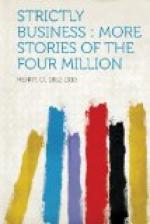The invader was a young man with light blue eyes, a hanging lip and hair the exact color of the little orphan’s (afterward discovered to be the earl’s daughter) in one of Mr. Blaney’s plays. His trousers were corduroy, his coat short-sleeved, with buttons in the middle of his back. One bootleg was outside the corduroys. You looked expectantly, though in vain, at his straw hat for ear holes, its shape inaugurating the suspicion that it had been ravaged from a former equine possessor. In his hand was a valise—description of it is an impossible task; a Boston man would not have carried his lunch and law books to his office in it. And above one ear, in his hair, was a wisp of hay—the rustic’s letter of credit, his badge of innocence, the last clinging touch of the Garden of Eden lingering to shame the gold-brick men.
Knowingly, smilingly, the city crowds passed him by. They saw the raw stranger stand in the gutter and stretch his neck at the tall buildings. At this they ceased to smile, and even to look at him. It had been done so often. A few glanced at the antique valise to see what Coney “attraction” or brand of chewing gum he might be thus dinning into his memory. But for the most part he was ignored. Even the newsboys looked bored when he scampered like a circus clown out of the way of cabs and street cars.
At Eighth Avenue stood “Bunco Harry,” with his dyed mustache and shiny, good-natured eyes. Harry was too good an artist not to be pained at the sight of an actor overdoing his part. He edged up to the countryman, who had stopped to open his mouth at a jewelry store window, and shook his head.
“Too thick, pal,” he said, critically—“too thick by a couple of inches. I don’t know what your lay is; but you’ve got the properties too thick. That hay, now—why, they don’t even allow that on Proctor’s circuit any more.”
“I don’t understand you, mister,” said the green one. “I’m not lookin’ for any circus. I’ve just run down from Ulster County to look at the town, bein’ that the hayin’s over with. Gosh! but it’s a whopper. I thought Poughkeepsie was some punkins; but this here town is five times as big.”
“Oh, well,” said “Bunco Harry,” raising his eyebrows, “I didn’t mean to butt in. You don’t have to tell. I thought you ought to tone down a little, so I tried to put you wise. Wish you success at your graft, whatever it is. Come and have a drink, anyhow.”
“I wouldn’t mind having a glass of lager beer,” acknowledged the other.
They went to a cafe frequented by men with smooth faces and shifty eyes, and sat at their drinks.
“I’m glad I come across you, mister,” said Haylocks. “How’d you like to play a game or two of seven-up? I’ve got the keerds.”
He fished them out of Noah’s valise—a rare, inimitable deck, greasy with bacon suppers and grimy with the soil of cornfields.
“Bunco Harry” laughed loud and briefly.




